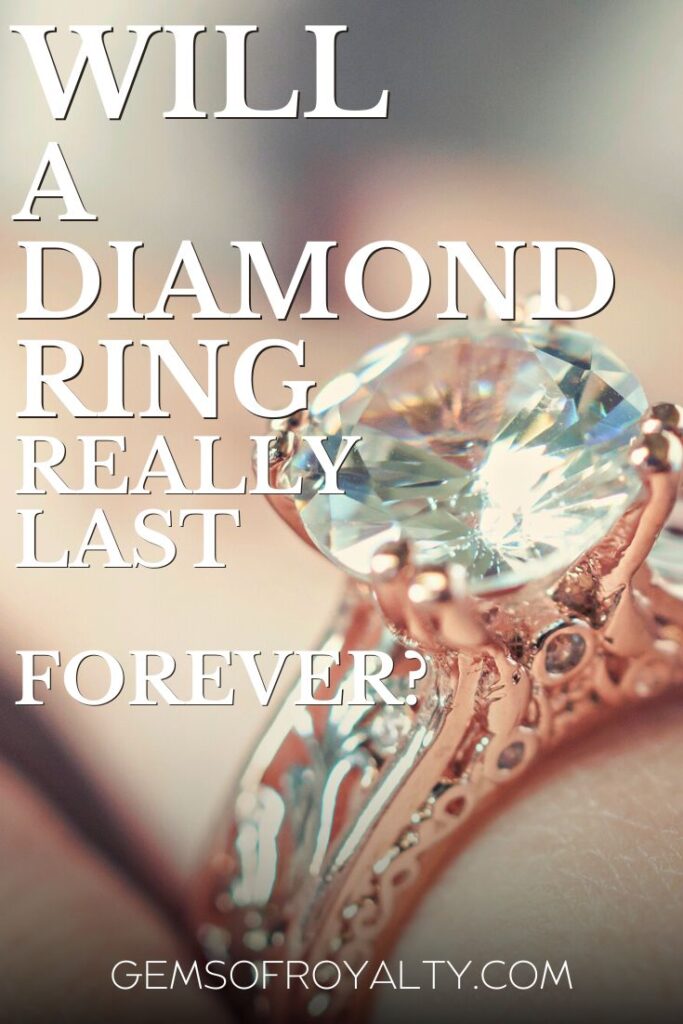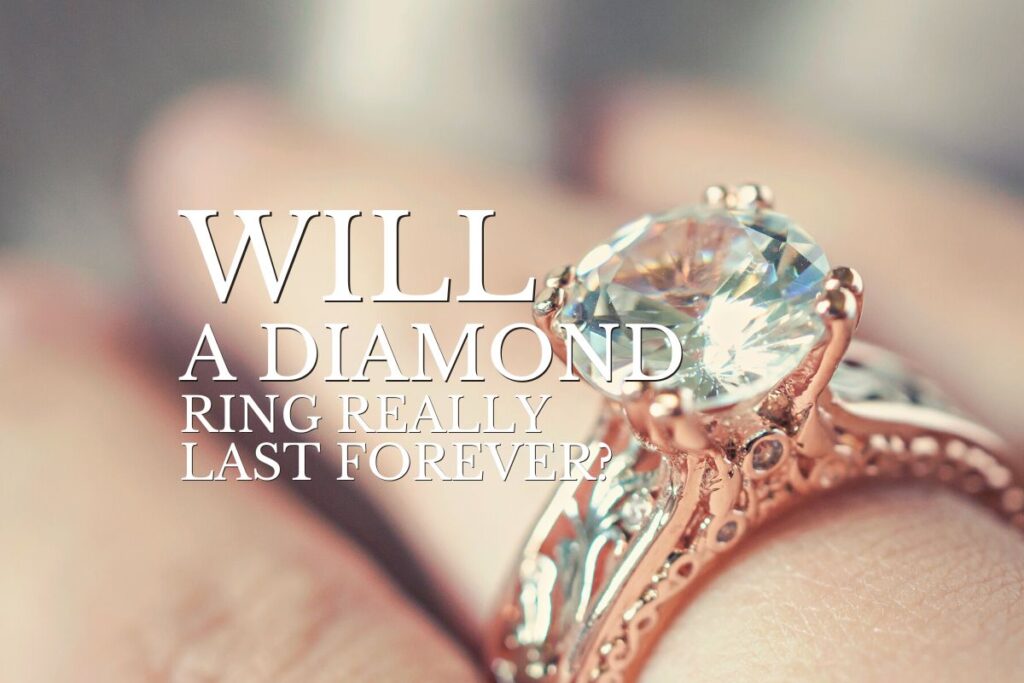Are you wondering if your diamond ring will truly last forever? Don’t worry, you’re not alone. In this post, we’ll explore the truth behind the phrase “diamonds are forever” and what it really means for your beloved piece of jewelry.
Diamonds are known for their durability and hardness, which is why they’re often used in engagement rings and other fine jewelry. However, diamonds can still be damaged or destroyed under certain circumstances. So, while diamonds may be long-lasting, they’re not truly “forever.”
Want to know more about the lifespan of diamond jewelry? If so, keep reading to learn about the different factors affecting a diamond’s durability and what you can do to protect your ring. Let’s begin.
Diamonds Are Forever… or Are They?
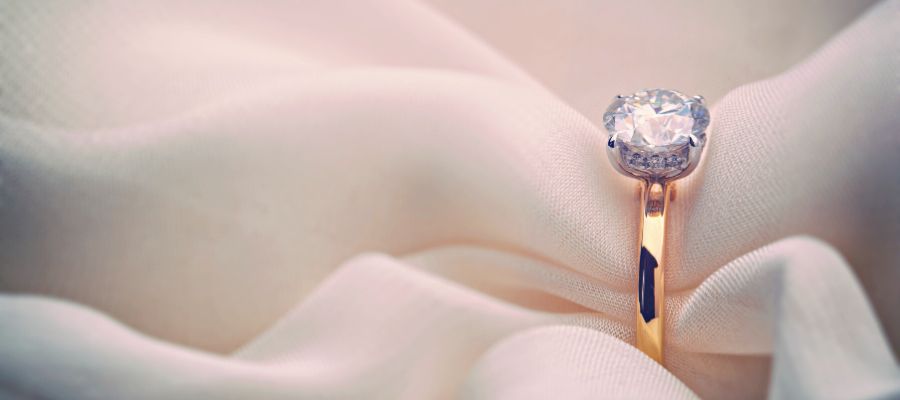
The phrase “diamonds are forever” has become synonymous with engagement rings and eternal love, but is it really true? Well, the De Beers diamond company actually coined this iconic phrase in the 1940s as part of a marketing campaign to increase diamond sales!
The idea was to link diamonds with eternal love and commitment, and it was so successful that the phrase has since become a household saying.
However, while diamonds are known for their durability and hardness, they can still be damaged or destroyed under certain circumstances. For example, a diamond can chip if it’s struck at just the right angle, or it can be scratched by another hard substance. Diamonds can also be affected by extreme heat or pressure, which can cause them to crack or shatter.
So, while diamonds may be long-lasting, they’re not truly “forever.”
That being said, diamonds are still popular for engagement rings and other fine jewelry due to their exceptional beauty and durability. A diamond can easily last a lifetime and beyond when properly cared for.
The Mohs Scale of Mineral Hardness: How Diamonds Measure Up
One way to better understand a diamond’s durability is to look at its hardness on the Mohs scale of mineral hardness. This scale, named after German mineralogist Friedrich Mohs, measures the relative hardness of minerals based on their ability to scratch or be scratched by other materials.
Diamonds are the hardest known natural substance, with an impressive rating of 10 on the Mohs scale. This means that diamonds can scratch any other material, including other diamonds.
In comparison, other common materials used in jewelry, such as gold and silver, have a hardness of around 2-3 on the Mohs scale. So, it’s certainly no slouch in the resilience department.
But while diamonds’ high rating on the Mohs scale makes them resistant to scratching and chipping, it’s still wise to remember that they’re not indestructible.
Protecting Your Diamond Ring: Tips and Tricks

Even though diamonds are known for their durability, protecting your diamond jewelry is still a good idea. Here are a few tips to help ensure your diamond ring stays in top condition:
- Avoid wearing your diamond ring during activities that could cause damage, such as heavy lifting or sports.
- Remove your diamond ring before applying lotions, perfumes, or other chemicals, as these can cause the diamond to become dull or discolored.
- Store your diamond ring in a safe place, such as a jewelry box with a soft lining, to prevent it from getting scratched or chipped.
- Clean your diamond ring regularly to keep it sparkling. You can use a soft brush, warm water, and mild soap to scrub the diamond and setting gently. Avoid using ultrasonic cleaners, as they can cause damage to the diamond or the setting.
- Consider getting your diamond ring insured. This can provide financial protection in case of loss, theft, or damage to the ring.
Diamond Ring Maintenance: Cleaning and Repairs
Proper maintenance is key to keeping your diamond ring looking its best. Here are a few tips for maintaining your diamond ring:
- Clean regularly to remove dirt and grime. You can use a soft brush, warm water, and mild soap to scrub the diamond and setting gently. Avoid using ultrasonic cleaners, as they can cause damage to the diamond or the setting.
- Visit a professional jeweler for check-ups. A jeweler can inspect the setting and prongs to ensure they’re secure and in good condition. They can also clean and polish the diamond to restore its sparkle, too.
- Repair any damage as soon as possible. If you notice a loose prong or a chip in the diamond, it’s smart to get it repaired to prevent further damage. A professional jeweler can quickly fix these issues and restore your diamond ring to its original condition.
Enhancing the Durability of Your Diamond Ring

Diamonds are known for their toughness, but there are a few ways you can enhance the durability of your diamond ring to help it last even longer.
Here are some options to consider:
Diamond Coatings
Some diamonds have a thin coating applied to them to make them more resistant to scratching and other types of damage. These coatings are usually very thin and can be challenging to see with the naked eye.
They’re applied using a process called chemical vapor deposition (CVD), which involves using high temperatures and chemical vapor to deposit the coating onto the surface of the diamond. While these coatings can help increase the durability of the diamond, it’s important to note that they may not be permanent and need to be reapplied over time.
Diamond Hybrids
Diamond hybrids are manufactured diamonds created using the same chemical vapor deposition process. But this process involves using high temperatures and chemical vapor to grow the diamond from a gas mixture.
Diamond hybrids are typically more durable than natural diamonds, and they’re less expensive.
What’s more, they’re also more environmentally friendly, not requiring mining or harsh chemicals.
While diamond hybrids may not have the same hardness level as natural diamonds, they can still be a good option for those who want a durable and affordable diamond alternative.
Diamond Simulants
Diamond simulants mimic the appearance of diamonds (but they’re not actually real diamonds). You’ve probably heard of cubic zirconia and moissanite, for example.
While these materials aren’t as hard as diamonds, they’re still more durable than other gemstones and can be a good option for those who want the look of a diamond without the cost.
Diamond simulants are often used as a cheaper alternative to diamonds in costume jewelry and other non-fine jewelry as well.
Choosing the Right Option for You
It’s wise to weigh the advantages and disadvantages of each option when considering enhancements to your diamond ring’s durability.
Diamond coatings and hybrids offer additional protection for your diamond but require extra care and maintenance. Diamond simulants may be less expensive, but they may not have the same level of durability as natural diamonds.
Diamond Ring Appraisals: Why and When To Get One

A diamond ring appraisal is a professional evaluation of the value of your diamond ring. There are several reasons why you might want to get a diamond ring appraisal, so let’s take a look at a few of them:
- Insurance: If you’ve insured your diamond ring, your insurance company will likely require an appraisal to determine the ring’s value for coverage purposes.
- Resale: If you’re considering selling your diamond ring, an appraisal can help determine its value and set a fair price.
- Estate planning: If you include your diamond ring in your estate plan, an appraisal can help determine its value for tax and inheritance purposes.
- Personal curiosity: You may simply be interested in knowing the value of your diamond ring for your own knowledge (It can be fascinating, after all!)
When getting a diamond ring appraisal, choosing a professional appraiser trained and certified in evaluating diamond jewelry is crucial.
An appraisal should include a detailed description of the ring, including the diamond’s type and quality, the setting’s metal and design, and other notable features. It should also include a valuation of the ring based on current market conditions.
Getting your diamond ring appraised every few years is a good idea to ensure the value’s accurate and up-to-date. This can be especially important if you’ve made significant changes to the ring, such as resizing, adding, or removing diamonds.
Insuring Your Diamond Ring: Is It Worth It?
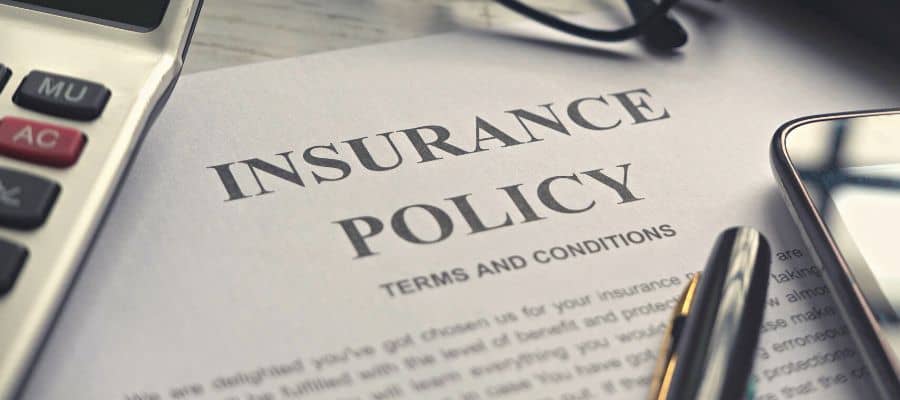
One way to protect your diamond ring is to insure it. But is it really worth it? Here are a few things to think about when deciding whether to insure your diamond ring:
- Value of the ring: If you have a valuable diamond ring, it may be worth insuring simply to protect against loss, theft, or damage.
- Probability of loss: Insurance provides peace of mind if you’re worried about losing your diamond ring, especially if you wear it frequently or travel often.
- Cost of insurance: Before deciding to insure your diamond ring, compare the insurance cost with the ring’s value. If the insurance cost is high compared to the ring’s worth, it may not be worth it.
Ultimately, whether or not to insure your diamond ring is a personal decision. But it’s wise to weigh the potential risks and costs to determine if insurance is the right choice. If you decide to insure your diamond ring, shop around and compare policies to find the best coverage before you settle, as the prices can vary quite a bit.
Replacing a Lost or Stolen Diamond Ring: Options and Costs

Losing a diamond ring can be a heart-wrenching experience, whether it’s due to theft, misplacement, or an accident. If you find yourself in this unfortunate situation, there are a few options to consider for replacing your diamond ring:
- Insurance: If you’ve insured your diamond ring, you can use your insurance policy to cover the replacement cost. Check your policy for details on what’s covered and what’s not.
- Replacement: If you don’t have insurance or your policy doesn’t cover the loss, you may need to pay for a replacement ring out of pocket. Unfortunately, this can be a significant expense depending on the original ring’s value and the replacement cost.
- Custom design: If you have a unique or sentimental diamond ring that’s difficult to replace, consider making a custom ring. This can be more expensive than buying a ready-made ring, but it allows you to recreate the original ring or design something even more special.
Diamond Ring Repairs: When and How To Fix Damage
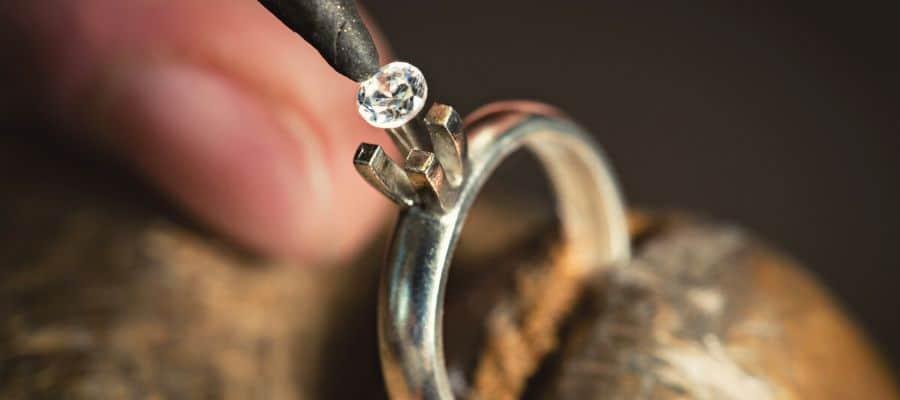
Even with proper care and maintenance, diamond rings can sometimes suffer from damage, such as chipped diamonds, loose prongs, or other issues. If you notice any damage to your diamond ring, it’s important to address it as soon as possible to prevent further damage. Here are a few tips for repairing your diamond ring:
- Take your ring to a professional jeweler for repairs. A jeweler has the tools and expertise to fix your ring correctly and restore it to its original condition.
- Don’t try to fix the ring yourself. If you’re not trained in jewelry repair, it’s easy to make things worse or even damage the ring further. Leave it to the professionals.
- Know what type of repair is needed. Different types of damage require different kinds of repairs. For example, a chipped diamond may need to be recut or replaced, while a loose prong may just need to be tightened.
- Consider the cost of repair. Depending on the extent of the damage and the type of repair needed, the cost of fixing your diamond ring can vary. Be sure to get an estimate from the jeweler before proceeding with any repairs.
Final Thoughts
While diamonds are not “forever,” proper care and maintenance can still help your diamond ring last for many years. You can also enhance the durability of your ring with coatings, hybrids, or simulants or simply maintain it with regular cleaning and repairs.
But don’t forget the sentimental value of your diamond ring, which can be just as crucial as its monetary value. A diamond ring can hold a special place in your heart, whether it’s a gift, an inheritance, or a symbol of love. So, always protect and care for it so it remains a treasured part of your life.
If you found this article useful, make sure you save this pin below to your Jewelry board.
